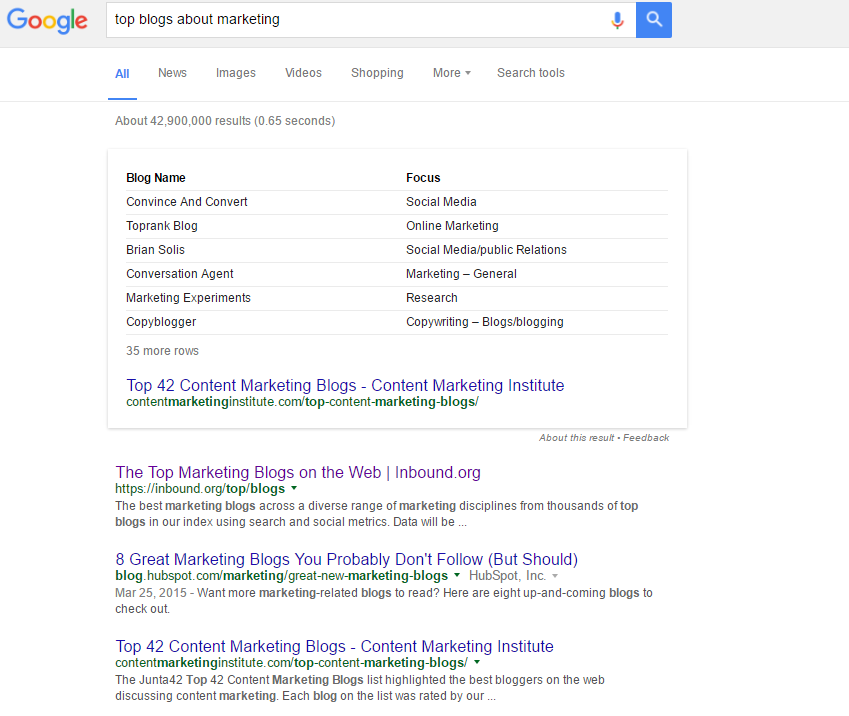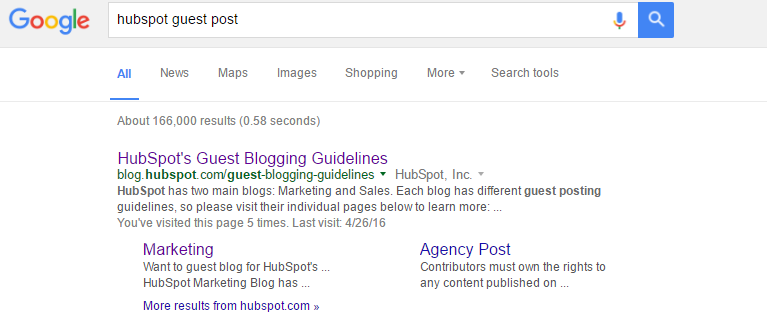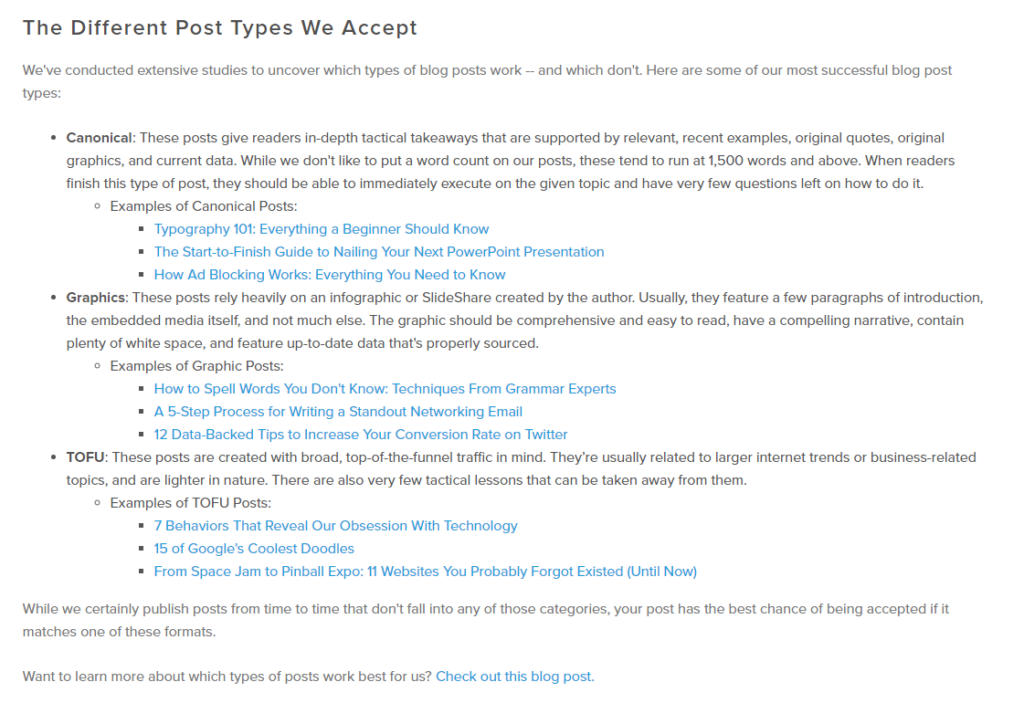I don’t know about you, but when I started out as a freelance writer, I had no fucking clue how to pitch a guest post and actually get it accepted.
So I just “winged it” for a while, hoping something would eventually work out.
The problem with that?
There was no strategic approach — and a strategic approach is exactly what you need when you’re pitching a guest post.
That’s something I eventually learned.
Now, you might be thinking:
Who are YOU to tell me how to write a guest post pitch?
Well, I’m not just some dumbass who’s preaching something they haven’t practiced – I can tell you that much.
In fact, I’ve submitted tons of guest post pitches that have been accepted, including for ProBlogger and Freshbooks. One of them won a pitching contest, and another one got this response:
“P.S. Your pitch was FANTASTIC!”
I’m not saying this to brag.
I just know how to write a bitchin’ pitch, and I use a proven approach every time.
And today, I’m going to cover that entire process with you so you can get out there and start landing some sweet guest post opportunities, my friend.
But let’s not get too far ahead of ourselves just yet.
First:
…Why would you want to write a guest post anyway?
1. Guest posting establishes you as an authority figure.
If you saw someone publish a guest post on TechCrunch, you’d automatically perceive them as some kind of technology expert, right?
At the very least, you’d understand right away that they’re knowledgeable about technology.
And you can establish expertise and build credibility online by guest posting too.
2. Guest posting helps you land new freelance writing clients.
My freelance writing niche is B2B/marketing blog posts. So, not too long ago, I contributed to a blog called Launch and Hustle.
The guest posts I submitted were all about B2B and marketing topics. And they were marketed to an audience of business owners.

I’m sure you can guess what I’m about to tell you.
That’s right – several people who saw my guest posts reached out to me afterward to ask about hiring me for freelance writing work.
So make no mistake – guest posting can and will land you some solid freelance writing clients if you approach it correctly.
3. You can get backlinks for your website.
Last time I checked, my freelance writer website was ranking #1 on Google for my target keyword.
But if you visit my site, you’ll notice that I don’t have keywords stuffed into any of my on-page content.
Nope – I don’t have to, because I have tons of backlinks from guest posts. And those backlinks let Google know that my site is the real deal.
4. Guest posting an easy way to build your freelance writing portfolio (and get credibility!).
I get it – it’s tough starting out as a newbie freelance writer or blogger.
You feel like you’re invisible, you don’t know how to get good samples, and you might even get so discouraged that you feel ready to say “fuck it” and head back to your 9-to-5.
Don’t do that.
Instead, create your own opportunities to build a portfolio of strong writing samples by pitching guest posts to blogs popular among your target clients.
Then, put those writing samples up on your professional, niche-optimized freelance writer website.
(Yes, you *must* have a pro writer website to succeed in this industry. If you don’t have one, stop right here and read this.)
5. Guest posting can help you break into a new freelance writing niche – IF you know how to pitch a guest post pitch that actually gets accepted. 🙂
Say you want to break into a new freelance writing niche – B2B/tech.
How would you establish your expertise in that area?
Simple – you’d pitch a guest post to a popular B2B/tech blog.
If your pitch is strong (by the end of this post, it will be!) and you’re a good writer, you don’t need tons of experience writing about a topic to be able to snag a guest post on a major or semi-major site.
I’m not just saying that. I pitched ProBlogger (see the screenshot here) last year, not long after I started freelancing, and I didn’t have any writing samples about freelance writing at that time.
…But they accepted my pitch and published the post I wrote!
So now, you’re probably wondering exactly how you can find the best sites to pitch and write a pitch that has the editor saying:
DAYUMMMMM. YAASSSSSSS. PLEASE WRITE FOR US.
Let’s go over how it’s done, and I’ll give you some examples based on pitches that have worked for me in the past.
How to Pitch a Guest Post and Gets Accepted Every Time (Get Featured on Major Websites!)
1. Get yo’ mind right.
I shit you not – this is one of the most important steps you’ll take in the process.
That’s because approaching guest blogging with the right mindset makes a huge difference in the actions you take and how you take them.
More specifically, you need to think about this:
You’re writing guest posts for a reason.
Ask yourself why you’re doing it (to land high-paying clients? to break into a new niche?) and make sure all of your efforts are focused on fulfilling that goal.
For example, if you want to land freelance writing clients, you can’t just submit a guest post to any ol’ blog – you need to submit it to one your clients are likely to read!
The point here is to be strategic.
Every guest post you write should have a purpose for your business – unless you’re strictly doing it for fun.
Want to steal my EXACT guest post pitch templates that got me featured on major websites? Click here.
2. Find the right sites to pitch.
Okay – now that you know why you want to write a guest post, you need to figure out who you’re going to pitch your post to.
Let’s go over an example.
Say you’re a freelance writer looking to break into a new niche: writing in-depth blog posts about marketing.
Head over to your new bestie, Google.com, and start searching your little heart out until you find the best guest blogging opportunity in the marketing niche.
Here’s what you might search for:

Okay – awesome. You can see that the first link is all about “The Top Marketing Blogs on the Web.”
Click that shit.

Now, you know that Hubspot is one of the top marketing blogs on the internet, so you need to investigate to determine:
- Whether or not they’re accepting guest posts
- Whether or not posting there will help you accomplish your business goals
- Whether or not you can offer them something awesome for their audience (which should also be your target audience)
Let’s start with the first one:
Are they accepting guest posts?

Looks like they are since they have guest blogging guidelines!
Back to your business goals – you’re looking to break into freelance blogging about marketing topics, right?
So, your target audience is probably going to be marketing agencies.
Since Hubspot’s marketing blog is popular among marketers, you can feel pretty confident that lots of people who work at agencies will see your guest post there.
So yes – posting there would help you accomplish your goal of breaking into a new niche and establishing yourself as an authority in that niche (since HubSpot is an authoritative website that’s popular among marketers).

Now, all that’s left to do is determine whether or not you can offer them something of value.
Because the KEY to getting a guest post accepted is offering an editor something that will benefit them (drive social media shares, bring in traffic, etc.).
And to do that, you need to:
3. Look through the site’s current posts and guest blogging guidelines.
Trust me – one of the worst things you can do is write a pitch without looking over the site’s pitching guidelines.
Not only will ignoring the guidelines annoy the editor – it’ll make them question your ability to follow basic instructions.
And that means that you’ve just flushed your chances at getting published on their site down the shitter.
So use one (or both!) of these methods to find the site’s guidelines:
- — Google “_____ guest post guidelines”
- — Use the site’s search tool and look for “guest post guidelines”
Once you’ve found the guidelines, READ THEM.
Every single word.
You might find something there that affects your entire approach, so it’s good to get this step out of the way early on.
For example, here are some of HubSpot’s guest post guidelines for their marketing blog:

Whew – lots of good info there, huh?
It’s easy to see how you could completely fuck up your pitch if you failed to read these guidelines.
They only accept 3 types of posts, so if you pitched something else, you’d just be wasting your time (and the editor’s!).
Once you’ve looked over the guidelines, it’s time for you to comb through the site’s current blog posts. While doing this, you need to ask yourself a few questions:
- — What kind of writing tone do these posts have?
- — How are these posts formatted?
- — What kinds of topics are discussed on this blog?
- — Which of the posts here are the most popular?
Questions like these can help you start thinking about which guest post topic to pitch and how to write a guest post pitch that’s sure to get accepted.
Also:
PLEASE search the site for your topic idea BEFORE you pitch.
You need to see if it has already been covered. If it has, it’s a no-go and you’ve got to think of a new topic.
And that brings me to my next point.
4. Pick the right topic.
Let’s face it – if you pitch a guest post about the 10 best iPhone apps to a blog all about gardening tips, that shit’s going to get deleted faster than a “you just received a $1,000,000 inheritance, so please give me your SSN# and bank account info!” scam email.
I’m not just saying that.
One time, someone pitched me a guest post for Creative Revolt, and they wanted to contribute something that had nothing to do with blogging or freelance writing.
My response?
DELETE.
Sounds harsh, but think about it – if they didn’t even take the time to look through my blog posts and acknowledge my target audience, they probably weren’t going to do a good job on the guest blog post anyway.
The point here?
The topics you pitch need to be relevant to the site’s target audience.
For example, if you’re pitching to Hubspot, you’d want to write something relevant to marketers, because that’s who reads their blog.
One more thing to note:
If the site you’re pitching has a “popular posts” section, check that out and see if you can come up with something similar (but still different enough to where they won’t have the same post twice!).
And if you’re really confident in your topic – like, that shit is sexy as fuck – then you might want to pitch just that one topic to the editor.
But in many cases, it’s best to offer the editor a few different topics with a quickie summary of each. That way, they can choose the one they want the most (or they may even want a couple of them!).
If you want to see exactly how I write guest post pitches (with screenshots of guest post pitches that were accepted by major sites!), I’ve got some bangin’, proven templates for you right here:
5. Write your pitch like a BOSS.
Alright – now that you’ve done all the research and picked some great topics to pitch, it’s time for you to sit down and write the actual email.
Here are a few things you’ll want to keep in mind:
— Personalization is key. Take it a step further than including the editors name, and actually mention something you like about their blog/site! I’m not saying you should be a kiss-ass here – I’m just saying you need to show the editor that you’ve done your research and you’re not just sending the same boring ass pitch to a zillion different people.
— Make it about THEM. Don’t make the mistake of telling the editor about how your guest post will help YOU reach your business goals. Instead, tell them why your post will engage their audience and help them drive traffic, get more social media engagement, etc.
— Be brief. For the love of the Flying Spaghetti Monster, PLEASE don’t write a massive pitch email that includes your entire life story. And don’t waste time talking about how “researched” and “well-written” your post will be, because DUH. Just give a brief background on who you are (including a link to your site/portfolio/samples) and why you’re qualified to write the guest post, and move straight into your pitch and how your guest post can help them.
— Send the email from a business email address. Seriously – you need an email address that isn’t yourname@gmail.com if you want to be taken seriously by big publications. This may not be a deal-breaker in every situation, but a professional email address is definitely something you’ll need to really grow your business and build credibility. And if you want bonus points, slap an awesome email signature up at the end of your email.
You got it, dude – click here.
Related: How I Built a $5,000/mo Freelance Writing Business in 4 Months (Month-by-month Breakdown!)
6. Follow up.
Not too long ago, I send a guest post pitch to Freshbooks.
I knew my pitch was solid because I had done my research, but I didn’t hear anything back for several days.
Instead of wallowing in sorrow and wondering why they rejected me, I simply followed up.
And guess what?
The editor had been out of the office sick – that’s why she wasn’t able to get back to me quickly.
The lesson here is to ALWAYS follow up after you pitch.
Just because you haven’t heard anything back for a couple weeks doesn’t mean an editor is ignoring you or rejecting you.
They’re probably out of the office. Or maybe they just missed your email.
7. Write your guest blog post.
When the editor accepts your pitch, it’s time to start writing!
Of course, you’ll want to write in your own unique voice, but also consider the website’s guidelines.
For example, I drop tons of F-bombs here on my blog, but that shit wouldn’t fly on lots of other sites. I’d have to adjust my style a little to fit their audience.
Also, make sure you follow any other guidelines (AP style? Formatting? Submitting as a Google Doc vs Word Doc?) to make everything easier for the editor.
And BOOM – just like that, you’ve got a fine as hell writing sample to show potential clients in a new freelance writing niche. Or to use to grow your blog audience. Or whatever your business goal is.
One more thing I should mention here:
You WILL get rejected sometimes.
And that’s okay – it happens to the best of us.
It’ll happen a lot less if you use my proven guest post pitch scripts right here though. Just sayin’. 🙂
Still though…
Don’t give up just because someone turns you down. Keep taking action and pushing forward with your business!
Because it’s WORTH IT.


